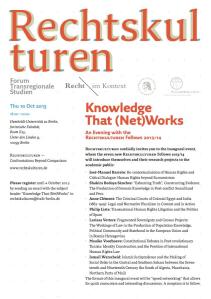This page has moved to philipliste.de
Author Archives: prliste
Rechtskulturen Reading Circle
Critical comparisons in legal studies
The reading circle is intended as a space of academic exchange outside the usual classroom/conference setting and open to anybody interested. Please write an e-mail to rechtskulturen@rewi.hu-berlin.de if you would like to participate in a session and we will be happy to forward you the text. We will keep you up-dated about our selection of texts and meetings. Of course, we are also very much open for any suggestions you might have and would enjoy the opportunity to discuss texts/topics suggested by you.
ASIL ESIL Rechtskulturen Workshop on International Legal Theory
Politics and Principle in International Legal Theory
From November 14-15 I will participate in the ASIL ESIL Rechtskulturen Workshop on International Legal Theory at the University of Michigan Law School in Ann Arbor. A draft program can be found here.
Rechtskulturen inaugural event, Oct 10
 Rechtskulturen cordially invites you to the inaugural event on Thursday, 10 October where the seven new Rechtskulturen Fellows 2013-14 will introduce themselves and their research projects to the academic public:
Rechtskulturen cordially invites you to the inaugural event on Thursday, 10 October where the seven new Rechtskulturen Fellows 2013-14 will introduce themselves and their research projects to the academic public:
• José-Manuel Barreto: Re-contextualisation of Human Rights and Critical Dialogue: Human Rights beyond Eurocentrism
• Shakira Bedoya Sánchez: “Exhuming Truth”, Constructing Evidence. The Production of Forensic Knowledge in Post-conflict Somaliland and Peru
• Anne Clément: The Criminal Courts of Colonial Egypt and India (1862-1919): Legal and Normative Pluralism in Context and in Action
• Philip Liste: Transnational Human Rights Litigation and the Politics of Space
• Larissa Vetters: Fragmented Sovereignty and Census Projects: The Workings of Law in the Production of Population Knowledge, Political Community and Statehood in the European Union and in Bosnia-Herzegovina
• Maaike Voorhoeve: Constitutional Debates in Post-revolutionary Tunisia: Identity Construction and the Position of International Human Rights Law
• Ismail Warscheid: Islamic Jurisprudence and the Making of Social Order in the Central and Southern Sahara between the Seventeenth and Nineteenth Century (far South of Algeria, Mauritania, Northern Parts of Mali)
When: Thursday, 10 October 2013, 18:00–20:00
Where: Humboldt-Universität zu Berlin, Juristische Fakultät, Room E 25, Unter den Linden 9, 10099 Berlin
The program and more information can be found here:
http://www.rechtskulturen.de/fileadmin/pdf/rechtskulturen/Kalender/2013-10/RK-Karte-Knowledge_That_NetWorks-2013-3.pdf
Rechtkulturen Fellow in Berlin
From October 2013 I am Fellow of the Berlin Postdoctoral Fellow Program Rechtskulturen: Confrontations Beyond Comparison for the academic year 2013-2014! Research project (Abstract) | See Rechtskulturen Homepage
Talk at the Center for Law, Society, and Culture Colloquium Series (Indiana University)
Thursday, September 26th, 4:00 pm, Maurer Law School Faculty Conf. Room:
The Law & Society Center Workshop will host a presentation by Philip Liste (University of Hamburg), who will present his paper, “Transnational Human Rights Litigation and the Production of Normative Space.” Light refreshments will be provided. A full list of Law & Society Center events for the semester can be found at their webpage: http://law.indiana.edu/centers/lawsociety/workshop.shtml
Research Stay at Maurer Law School
 During September 2013 I stay at the Maurer Law School, Indiana University, Bloomington, IN. The research stay is funded in the context of a partnership programme of University of Hamburg and Indiana University. I will be working on transnational human rights litigation and the production of space.
During September 2013 I stay at the Maurer Law School, Indiana University, Bloomington, IN. The research stay is funded in the context of a partnership programme of University of Hamburg and Indiana University. I will be working on transnational human rights litigation and the production of space.
Networked Surveillance as Nascent World State Expertocracy?
“Reasonable is that the heads of state – when talking to one another – talk about how to deal with the issue, how serious to take the allegations and how to deal with them, to discuss the allegations, to clarify, to verify, or to resolve them. Reasonable is that those persons speak about the actual way of the one or the other side’s intelligence services’ conduct who possess the intensive knowledge of details of those issues.” (Undersecretary Seibert, Speaker of the German Government on NSA surveillance , Berlin, July 8, 2013)
Is this statement still compatible to any notion of democratic governance or a manifestation of a nascent world state expertocracy? Read my contribution to the Verfassungsblog: “Experten unter sich: Warum die Regierung findet, dass die Snowden-Affäre uns nichts angeht” (in German).
The Politics of Space: Kiobel v. Royal Dutch Petroleum
Read my contribution to the “Verfassungsblog“
Law is a ‘politics of space.’ The last week’s Supreme Court decision in ‘Kiobel’ significantly cuts the possibilities to sue human rights violators before courts in the United States, particularly when the relevant conduct occurred on the territory of a foreign sovereign. The decision builds upon a highly territorialized notion of law and points to what may be called a ‘nationalization’ of international law—with repercussions for the transnational law of public and private global governance. In the Kiobel case transnational oil corporations (Royal Dutch Petroleum/Shell) were accused of having aided and abetted in massive violations of human rights in Nigeria, including extrajudicial killings, crimes against humanities, and torture. The lawsuit was relying on the Alien Tort Statute (ATS) — a Judiciary Act enacted by the First Congress of the United States in 1789 — which is granting ‘aliens’ access to courts in the US for bringing tort claims basing on international law. (…) [read more at Verfassungsblog]
Kiobel v. Royal Dutch Petroleum
On Wednesday, Apr 17, the US Supreme Court has issued its decision on Kiobel. This time, Shell will not be held responsible for violations of human rights in Nigeria. And: Transnational legal opportunities have been curtailed. Human rights advocates are disappointed. New ways will have to be found in order to sue private corporations for human rights violations–with and without relying on the Alien Tort Statute. At the same time, those speaking in the name of private business hail the perpetuation of nation-state jurisdictional boundaries. What a “politics of space”!
“There is a politics of space because space is political” (Henri Levebvre)
A nice collection of positions can be found at the Business & Human Rights website.